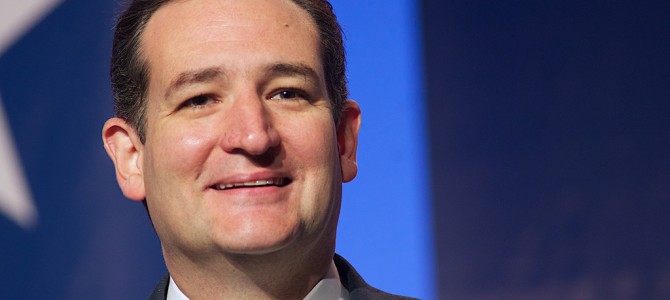These days, it’s popular to claim that Senator Ted Cruz is only looking out for himself. And this is undoubtedly true. Much in the same way John McCain is only looking out for himself and Chuck Schumer is only looking out for himself, and every millionaire Senator looking to hold on to his or her seat in perpetuity is looking out for #1. Cruz just happens to be better at it.
Take the kerfuffle over the debt-ceiling vote. When Mitch McConnell met with Senate Republicans colleagues this week, he proposed that they allow a vote on the House debt limit bill without GOP objection, a tacit surrender that would allow passage with a simple 51-vote majority. The 55 Senate Democrats, who would rather see the government shut down than concede to compromise, would win and then save the GOP from the inevitable political blowback that accompanies capitulation. (Now, if only the Republicans deployed the same level of creativity in their battles as they do in their surrenders, victory would be theirs!)
Rather than allow this expedient maneuver to place, Cruz demanded the Senate reach a 60-vote threshold, forcing five Republicans to join Democrats in the hike. This, predictably, infuriated the GOP establishment. McCain accused Cruz of instigating “needless drama that helps to explain why Republicans remain a minority.”
Yeah, that’s why.
What’s Cruz’s sin here? That he forced the GOP to be transparent about its position — a position that seems pretty reasonable considering the political realities of the situation. According to Betsy Woodruff’s reporting, most Republicans had no interest in voting for an increase. It’s preposterous to claim, no matter how often the Tea Party does, that moderate GOPers are “no better” than liberals simply because they’re losing on this issue. But if the debt ceiling isn’t a hill worth dying on – and it certainly isn’t – leadership should have explained this explicitly rather than leading on the base. It was only back in January when McConnell told the faithful on national television that some of “the most significant legislation passed in the past 50 years has been in conjunction with the debt limit. I think for the president to ask for a clean debt ceiling when we have a debt this size of our economy is irresponsible.” What McConnell should have added then is: but there’s nothing we can do about it right now. We have to work on winning more seats, and then we can stop this endless cycle of irresponsible spending.
In a recent piece, National Review’s Charles Cooke defends the GOP establishment’s handling of this and other battles: “In my estimation, the only thing of which Mitch McConnell and John Boehner have been guilty in the past few years is to have worked tirelessly within political reality and to have reacted sensitively to the hands that they were dealt.” Overall, I agree. Moreover, the House doesn’t get enough credit for putting a hard stop to the Democrats’ overly ambitious progressive agenda. Obstructing bad legislation is as valuable, if not more valuable, than working to make terrible legislation marginally less terrible. The GOP House successfully brought balance to Washington after a hard left turn by Democrats.
But life’s not fair. McConnell and Boehner don’t lead, they manage. And they’re about to lose the party. For starters, any fresh conservative ideas in the Senate are coming from Mike Lee, Rand Paul and Marco Rubio (who’s on thin ice, I know). They, like Ted Cruz, and like Senator Barack Obama before him, understand the appeal of idealism over pragmatism to those out of power. Obama voted against what is the now-sacred debt ceiling hike because he had nothing to lose and everything to gain. If you’re going to surrender, at the very least don’t make it look easy. And don’t try to cover up the terms.
As much as some of us are fans of “dysfunction,” tactically speaking, playing defense forever is no strategy. Yes, the establishment works tirelessly within the political realities of the day. Cruz, it seems, is more interested in changing the reality of his situation. Forcing a 60-vote threshold on the debt ceiling wasn’t only about the debt ceiling (which Cruz surely understood would be hiked), and it wasn’t only about his presidential ambitions (which he surely has), but creating the type of problems for the GOP that will help bring a bunch of Matt Bevins into the Senate and solidify his position.
If they attain more power, Tea Party conservatives may accept that tactical victories can often have more impact than a hollow but self-gratifying stand. At some point, they may accept that one of most effective weapons in policymaking — one that the Left uses with great success — is incrementalism. Fair or not, though, the problem with today’s Republican Party is that the only incrementalism people see is incremental surrender. Like the completely unnecessary debt ceiling lose. And if the establishment doesn’t turn that perception around in a hurry, they won’t be the establishment for much longer.
David Harsanyi is a Senior Editor at The Federalist and author of the forthcoming The People Have Spoken (and They Are Wrong): The Case Against Democracy. Follow him on Twitter.









